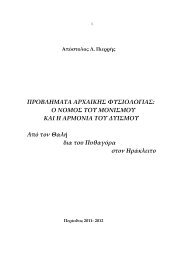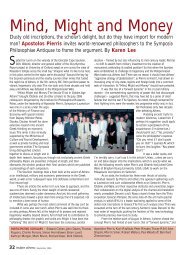6ὐθύς, i.e. without any prior reality being required for <strong>the</strong> reality <strong>of</strong> πάντα to subsist);hence, <strong>the</strong>re must be a principle before πάντα.b) The rejoinder c<strong>on</strong>sists in <strong>the</strong> view that o ne need not c<strong>on</strong>nect always and inevery way ( πανταχῇ) <strong>the</strong> πολλά with distincti<strong>on</strong> and multiplicity. For in an orderlysystem in which <strong>the</strong>re exists a single beginning as <strong>the</strong> source <strong>of</strong> everything thatfollows and <strong>of</strong> its order, this beginning, like an apex or summit <strong>of</strong> what follows, neednot be infected with <strong>the</strong> multiplicity which it produces in some way or o<strong>the</strong>r afteritself; that is, in short, <strong>the</strong> beginning and principle <strong>of</strong> multiplicity [10] may well be anabsolute One, even if this <strong>on</strong>e is part <strong>of</strong> <strong>the</strong> multiplicity; and similarly, <strong>the</strong> principle <strong>of</strong>distincti<strong>on</strong> may well be absolutely unified in itself though partaking in distincti<strong>on</strong>inasmuch as it is distinguished from that which follows from it.2.20. As <strong>the</strong> text stands we have: “but τὸ ἓν is <strong>the</strong> summit <strong>of</strong> <strong>the</strong> πολλά, andunit (μονάς) <strong>of</strong> <strong>the</strong> distinguished is <strong>the</strong> unified, while τὸ ἓν is even simpler than <strong>the</strong>unit”. There is <strong>of</strong> course perfect sense in this. We shall see that with D. <strong>the</strong> ἡνωμένονlies after τὸ ἓν in <strong>the</strong> “natural history” o f reality; so τὸ ἡνωμένον is not ἓν but ra<strong>the</strong>rμονάς, drawing <strong>on</strong> <strong>the</strong> distincti<strong>on</strong> between <strong>on</strong>e and unit which can be traced back toNeopythagoreanism and even to Aristotle, if not to ancient, early Pythagoreanism.But meaningful as <strong>the</strong> statements are, <strong>the</strong>y present some subtle occasi<strong>on</strong> forworry. Firstly, we might expect to hear that as <strong>the</strong> <strong>on</strong>e is summit <strong>of</strong> <strong>the</strong> many, so <strong>the</strong>unified is <strong>the</strong> summit (not <strong>the</strong> unit) <strong>of</strong> <strong>the</strong> distinguished. And this we can get byputting a comma after ἡνωμένον. But what <strong>the</strong>n <strong>of</strong> <strong>the</strong> fo llowing μονάς? In whatimmediately follows « μονάς» is used clearly to denote quasi-arithmetical unit, or atany rate, <strong>the</strong> unit <strong>of</strong> number [11]. So could it not be that it is applied here in <strong>the</strong>same sense? Hence my suggesti<strong>on</strong> for <strong>the</strong> inserti<strong>on</strong> <strong>of</strong> ἡνωμένον μονάς. And that this is probable seems to be c<strong>on</strong>firmed by what follows: mark <strong>the</strong>Ἀλλὰ πρῶτον μὲν etc. …ἔπειτα δὲ… The former disposes <strong>of</strong> <strong>the</strong> example (for as suchwe may c<strong>on</strong>strue, if <strong>the</strong> suggesti<strong>on</strong> is correct, <strong>the</strong> clause: “just as summi t <strong>of</strong> everynumber [12] is <strong>the</strong> unit”), whereas <strong>the</strong> latter combats <strong>the</strong> doctrine itself about <strong>the</strong>One.That <strong>the</strong>re is a marginal note in this place running so:τὸ ἓν κορυφὴ τῶν πολλῶν, τὸ δ᾿ ἡνωμένον ἤτοι μονὰς τῶν διακεκριμένων,
7apparently identifying <strong>the</strong> ἡνωμένον with <strong>the</strong> μονάς (not certainly since ἤτοι which R.reads c<strong>on</strong>fidently, is not really clearly seen <strong>the</strong>re), does not tell much against mysuggesti<strong>on</strong> since it is by a very later hand.On <strong>the</strong> o<strong>the</strong>r hand it should be noted that <strong>the</strong> positi<strong>on</strong> <strong>of</strong> μέν prohibits <strong>the</strong>above suggested train <strong>of</strong> thought; for we should have κορυφὴ τῶν μέν etc. And also<strong>on</strong> <strong>the</strong> suggesti<strong>on</strong>, <strong>the</strong> last clause καὶ τὸ ἓν ἔτι etc. has not <strong>the</strong> perfect point that ithas in <strong>the</strong> text as it stands. So, <strong>on</strong> <strong>the</strong> whole <strong>the</strong> suggesti<strong>on</strong> is to be rejected.c) Taking <strong>the</strong> example <strong>of</strong> <strong>the</strong> number, D. remarks that <strong>the</strong> unit c<strong>on</strong>tainsimplicitly and συνεπτυγμένως (not ἐν διεξόδῳ) all numbers, being <strong>the</strong>ir principle. Inthis way, <strong>the</strong> unit is everything whose unit it is, and this analogy, by implicati<strong>on</strong>, <strong>the</strong>nwould tel l that even in <strong>the</strong> One which is <strong>the</strong> summit <strong>of</strong> <strong>the</strong> πολλά, <strong>the</strong> πολλά arealready included, and so, eventually we have to h old <strong>on</strong> to <strong>the</strong> impossible view thatπολλά and πάντα appear right from <strong>the</strong> beginning in <strong>the</strong> great chain <strong>of</strong> being, as part<strong>of</strong> <strong>the</strong> ultimate datum.Then D. turns from <strong>the</strong> illustrati<strong>on</strong> to <strong>the</strong> illustrated itself (ἔπειτα δὲ etc.).The basis <strong>of</strong> <strong>the</strong> rejoinder is formed by <strong>the</strong> idea that <strong>the</strong> One can bel<strong>on</strong>g to<strong>the</strong> multiplicity whose principle it is, just as <strong>the</strong> beginning bel<strong>on</strong>gs to that whosebeginning it is and <strong>the</strong> summit to that whose summit it is. Now in combating th isbasis D. does not wish to have recourse to <strong>the</strong> first argument (1) against <strong>the</strong> positi<strong>on</strong>that <strong>the</strong> Primal Principle bel<strong>on</strong>gs to <strong>the</strong> totality <strong>of</strong> reality, but wants to stay within <strong>the</strong>boundary <strong>of</strong> his sec<strong>on</strong>d argument (2) , especially because he differentiates between<strong>the</strong> absolutely Primal Principle and <strong>the</strong> One, and he intends to keep <strong>the</strong> matter openin order to explain fur<strong>the</strong>r his <strong>the</strong>sis by utilizing a plausible objecti<strong>on</strong> to <strong>the</strong> verydifferentiati<strong>on</strong> which he maintains, as we shall see in <strong>the</strong> sequel. In denying <strong>the</strong>menti<strong>on</strong>ed basis, D. leads to a pr<strong>of</strong>ound intuiti<strong>on</strong> as to <strong>the</strong> nature <strong>of</strong> <strong>the</strong> One, which,again, is preliminarily treated here, since it will become <strong>the</strong> expressed object <strong>of</strong>inquiry in <strong>the</strong> sec<strong>on</strong>d (and, less directly, <strong>the</strong> third) secti<strong>on</strong> <strong>of</strong> <strong>the</strong> work.The denial c<strong>on</strong>sists in this: if x bel<strong>on</strong>gs essentially to Y, <strong>the</strong>n it is required inorder to complete, or completely make up <strong>the</strong> Y, in <strong>the</strong> sense that, should it belacking, <strong>the</strong> Y would not be enti re. But this is not <strong>the</strong> relati<strong>on</strong>ship existing between<strong>the</strong> One and <strong>the</strong> πολλά; for <strong>the</strong> latter do not “miss” <strong>the</strong> One [13]; in fact anythingthat is c<strong>on</strong>tained in <strong>the</strong> πολλά under <strong>the</strong> aspect <strong>of</strong> divisi<strong>on</strong> ( μερισμός) is alsoc<strong>on</strong>tained in <strong>the</strong> One under <strong>the</strong> aspect <strong>of</strong> absolute indivisibility ( κατὰ τὸ πάντῃ
- Page 2 and 3: 2GENERAL REMARKThe first section is
- Page 4 and 5: 4Four reasons are, in aporematic fa
- Page 8 and 9: 8ἀμερές). Thus nothing is mi
- Page 10 and 11: 10separate them. Basically, as Aris
- Page 12 and 13: 12produced by, it; the principle in
- Page 14 and 15: 14the fashion of its one-ness, i.e.
- Page 16 and 17: 16[36] it may be. Now the def inite
- Page 18 and 19: 18found, and (there found) in accor
- Page 20 and 21: 20in its elf (apart from the orderi
- Page 22 and 23: 22something whose immediate product
- Page 24 and 25: 24clearer, as the system is further
- Page 26 and 27: 26ἡνωμένον, which generate
- Page 28 and 29: 28We find in this here a good insta
- Page 30 and 31: 30fully see his point, and to take,
- Page 32 and 33: 32NOTES[1] Not quite “given” th
- Page 34 and 35: 34forget that, for the time being,
- Page 36 and 37: 36[28] The interpretation given to
- Page 38 and 39: 38[39] It can be shown that there c
- Page 40 and 41: 40being immersed in it, handling it










